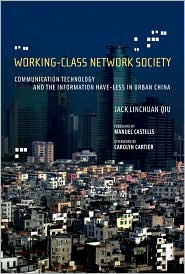
In Working-Class Network Society: Communication Technology and the Information Have-Less in Urban China, Jack Linchuan Qiu breaks down the dichotomy of information haves and have-nots by discussing the information “have-less.” Qiu frames his discussion around the emergence of a new working class of “network labor” and the effects of technology on the lives of migrants, the unemployed, micro-entrepreneurs, youth, retirees, and other marginalized groups in China.
Working-Class Network Society is broken down into three major sections: “Networks Materialized,” “The People of Have-Less,” and “A New Working-Class in the Making.” Qiu discusses both the regulation and resistance associated with the rise of Internet Cafés and inexpensive mobile telephony in China. After discussing the ways in which ICTs are provided in working-class communities, Qiu explores the information needs of specific “have-less” groups. Out of these groups, I found Qiu’s examination of migrant laborers within urban villages to be of particular interest, especially when juxtaposed with the effects of ICT use on the indigenous population.
Having conducted five years of empirical research in twenty Chinese cities, Qiu uses Working-Class Network Society as a means to discuss not only the underlying socioeconomic issues of the Chinese network society, but also to address the ways in which politics and government/institutional policies have contributed to the current Chinese informational state. By highlighting the diverse needs of the “have-less,” Qiu debunks the pedestrian view that insufficient access to technology is the primary cause of information poverty.




I really want to read that book; it sounds fascinating. If there's an way you'd lend it to me, let me know! What a better plan for summer than to curl up with a nice book about ICT in the developing/hyperdeveloped world! <-- I need help
ReplyDeleteDoes Qiu talk about what he thinks the primary cause of information poverty is?
ReplyDeleteLaura,
ReplyDeleteI'll be expanding upon this further when I present this week, but Qiu believes that a plethora of factors contribute to information poverty in China. Due to history of industrialization within China and some unique migratory policies and government regulations, a lot of the specific suggestions Qiu provides in this book wouldn't be applicable to ameliorating information poverty elsewhere. (His talk of grassroots networking and bottom-up strategies could easily be applied to other developing countries though.)
Toward the end of the book, Qiu does assert that the digital divide shouldn't be the only conceptual tool for discussing information inequality with ICTs. He references the knowledge gap (Tichenor, Donohue, and Olien, 1970) as well as Herbert Schiller's and Manuel Castell's theories on how an unequal distribution of information supports power asymmetry between the social classes, and between labor and capital (p. 234). His arguments throughout the book seem to uphold that there isn't a clear-cut answer for the issue, especially given the diversity of needs and users in the "have-less" population.
I'll talk more about this on Thursday and fill in the gaps that I didn't address here. :)